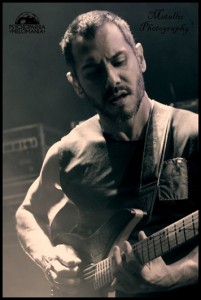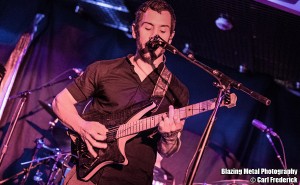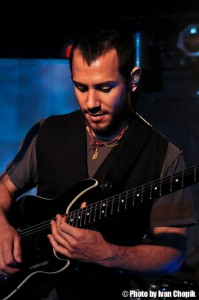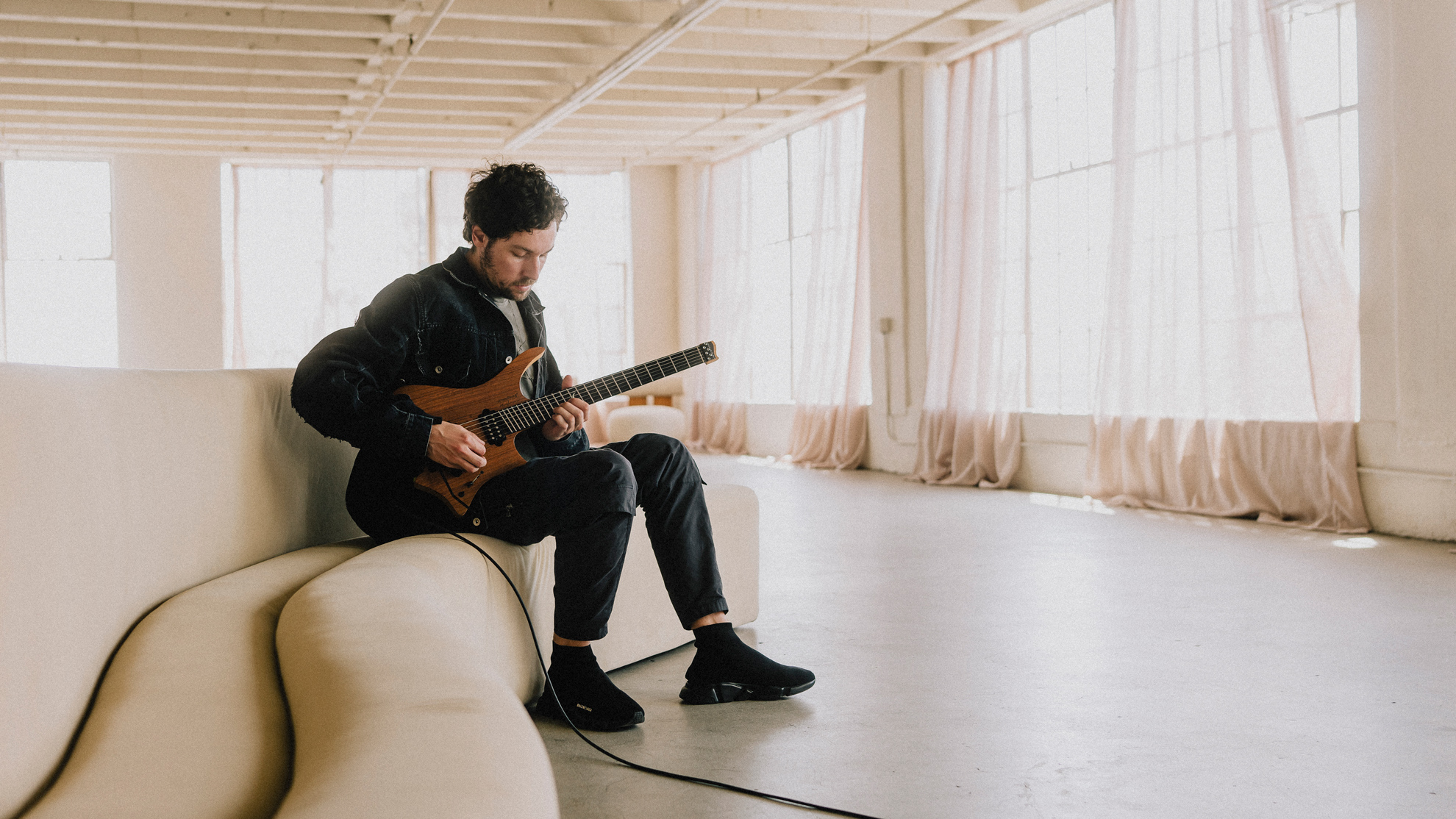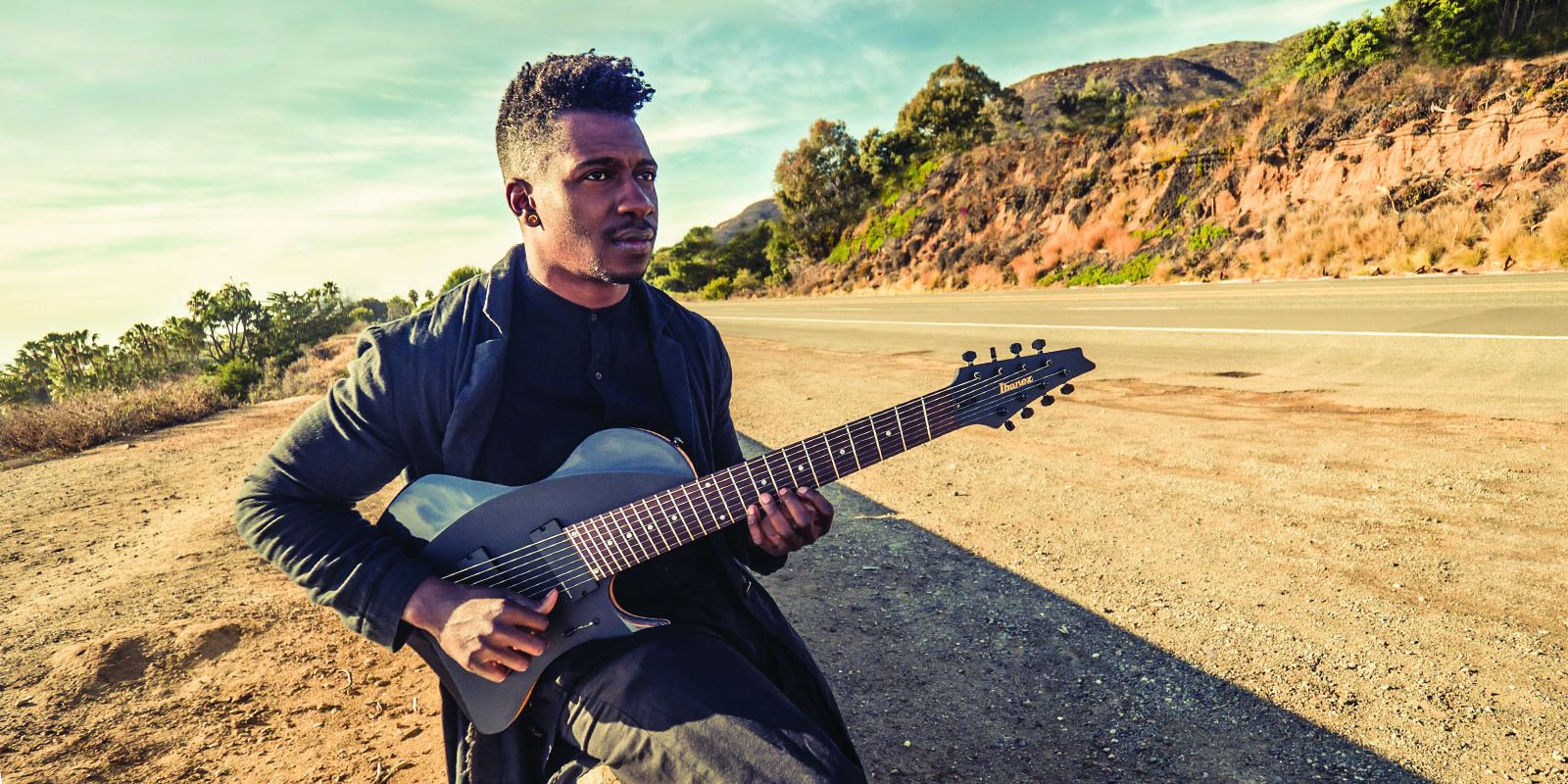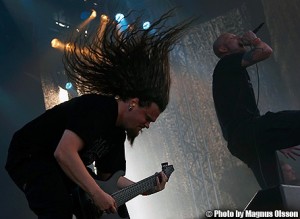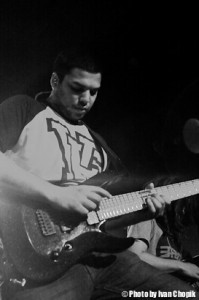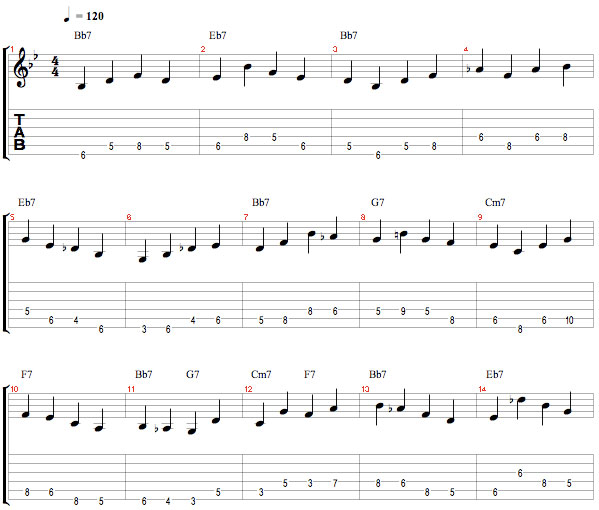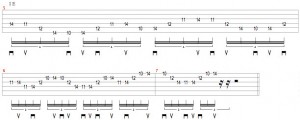In the third installment of our interview series with Paul Masvidal, we discussed what Paul does to keep his hands busy when he’s not working on Cynic, how even a player of his caliber still deals with insecurities, and how working so close to death helps inform his own life.
Part I | Part II | Part IV

SESSION WORK / MUSIC THERAPY
LD: You probably could do Cynic full-time, with rigorous touring, recording and all, but you don’t seem to feel that need or that pressure. What do you feel you get as an artist, lending so much of your craft and time to other people’s recording sessions and compositions?
PM: I want Cynic to be something that’s really pure and driven by art, not deadlines and touring. This project is like a fine diamond to me. We’ve always had that sense of integrity with it and we never want it to lose that. We’ve been lucky as musicians to be able to pull it off somehow. It’s not true, I think, in most cases, but for us we’ve been able to do it.
I, personally, write for television and all kinds of stuff. For example, I just did a pilot for NBC that I have my fingers crossed gets picked up. I produced this children’s book with Jim Carrey last year. I wear any kind of hat you give me. Basically, as soon as the phone rings, I’ll generally take the gig. I’m not too picky, especially if it’s in town.
I don’t really approach the session work I do in Hollywood as an artist. I’m really in service to someone else’s vision when I do that work. I love playing that role because Cynic is so self-serving; there are no rules and no structure and we just do what we want. When I get into a room with, for example, Jim Carrey and he has all these ideas, he’s just singing a cappella melodies and I’m trying to build arrangements around these tunes. I just want to make him happy with whatever it takes to fulfill his vision. That’s how I approach the TV work and the session work. I actually love being able to shift gears and change roles, to become just another dude in a bigger project and be quiet and just do my part as well as I can. I love that. It’s a totally different headspace.
I made a record last year with Aaron Freeman [aka Gene Ween], and we did this whole covers album of Rod McKuen songs called Marvelous Clouds. It was really cool. This guy put a whole band together, none of us knew each other, so we really just met in a studio with a bunch of charts and basically had to pump out fifteen songs or something in two, three days. It was old school. I don’t even know what’s going on with that record. It just came and went, but that’s how it goes for the session musician. You just do your job and disappear, if you want to keep up.
The gig I just did for this NBC show, it was all like bluegrass and country songs. Where else would I get to write that kind of stuff? I got my friend [singer-songwriter] Amy Correia to come over from Boston, and over the course of a week, essentially, we busted out seven, eight arrangements. We went right into the studio, got these Nashville guys, and cut it. It was amazing. I get to totally step out into new places.
There’s a reason why we go to school and study our instruments and play guitar like freaks in our bedrooms for eight hours a day for years and years. When you finally get out and exercise that stuff and see what you’ve got, it’s really affirming. It builds a lot of confidence, because you start to realize that you actually have some skill.
I remember in college I was trying to get deeper into the jazz thing and there was this famous jazz teacher who was known for being really intense and tough. I remember being so scared auditioning for him, just terrified of the whole thing. Then I got the gig and before you know it I’m playing around with a big band all over L.A. It was one of those things where it was like, ‘Wow, I can do this.’ We make these monsters out of our mind, our own insecurities. I do it constantly. What’s funny is that I realized I’m so scared of all these things, but I just push myself into it. I’m terrified and feel like totally inept, and yet I still walk into it.
| Behind-the-scenes footage of the making of Jim Carrey’s children’s book ‘How Roland Rolls,’ featuring Paul Masvidal. |
LD: What are you afraid of?
PM: Just not being good enough! There’s always that sense that most of the people that succeed are better at faking it. I mean, the reality is that there’s always this insecurity underneath of ‘I don’t know if I can do this’ or ‘I don’t know if I’m good enough.’ I’m a total wimp, but I go ahead and just go in there and do it. [laughs] I try to make it work. Nine times out of ten, it works out.
All those different jobs are so good for that, too. When you’re in a band all the time, it’s like its own bubble of reality where you’re calling the shots and it’s your work and everything revolves around you. When you’re working as a session musician, you’re really in service of other people’s work, too, and just trying to help. TV, for example, is completely picture related. Music is background; it’s meaningless. You’re the last person on the train. They do not really make a strong emphasis, especially with a lot of network stuff. It’s like, ‘Oh yeah, the music. Let’s do that.’
There are a lot of different ways of looking at this, but for me I remember making that decision when I was a kid. I think we all did as a band. We’re just so in love with music and so in love with playing that if we can just make a living doing this, we’re okay. If you can steer it in a certain direction and have it be something, fantastic! But to play and make a living? That alone is pretty damn cool. I think that’s how I try and approach it, from a state of gratitude. I realize it’s hard out there to make a living as a musician. It’s good to realize that having all these opportunities is a good thing.
LD: It’s striking to me that you still confess to self-doubt. For the nine times out of ten that you walk into a recording session and kill it, can you recall a remaining one time when you felt like you were out of your league?
PM: Oh yeah! [laughs] I feel like a lot of times I am out of my league and I’m just winging it, you know? I have a bunch of friends that are active film and TV composers and they’re sick musicians. One of them is just a ridiculous pianist. Just this past year we really bonded over a Keith Jarrett thing and I remember he’s like, ‘Let’s jam!’ We sat down and I was with my guitar and he’s with the piano and he’s improvising these Keith Jarrett-esque things. He had this crazy sense of African rhythms and really interesting, complex stuff that just comes second nature to him, but I remember just struggling trying to get a certain rhythmic thing. At one point I said, ‘Just give me a minute here!’ A lot of times, with really complex rhythmic stuff, I have to get it in my body to play it. I can intellectually look at it and probably read it, but to really play it I have to ingest it and embody it, and then it will feel right.
I remember being terrified, because I wasn’t getting it. He’s like, ‘try it again’ or ‘slow this down’ or ‘swing it a little.’ I was being stretched in every way. Everything I knew I could do, I had to pull out of my hat. I felt horrible about it. In the end, I didn’t feel like I fully did what I was supposed to do, but he was really happy. He got what he wanted, he mixed it, and damn, it was off! Normally, you can just fake your way through it enough and let those imperfections be okay, but this was one of those where I just felt like it was never okay. If it was okay with him, I had to be okay with it, because his standards are his own and somewhat higher than mine. Again, it’s almost like you get so good at beating yourself up and not thinking you’re good enough. I’m hopefully better at not doing that to myself as much as I used to.
These are our own standards that push us to become the musicians we are. We see things no one sees. We hear things no one hears. That’s why some artists make albums and never release them, because they’re caught up in these perceptual things that no one’s hearing and yet they’re tripping on it. It’s an ongoing thing. I don’t think I ever will feel 100% confident.
The guitar is so intimidating to me. It’s a beautiful thing, but it’s so dense. I feel like I could spend the rest of my life practicing and not really doing much else. I’m in awe of the instrument and of music in general, but we do what we can and we keep going for it and seeing what happens, right?
LD: I understand that you did some outreach and healing work in the area.
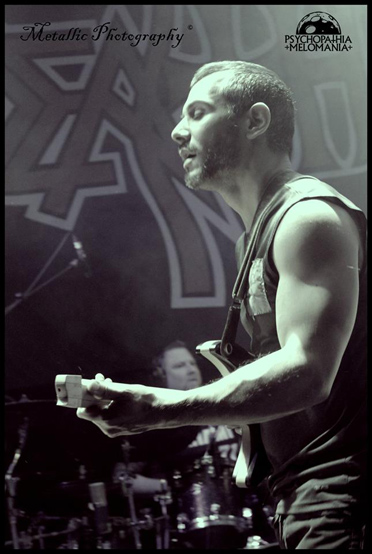
PM: Yeah. I do volunteer work for a certain organization right now. I’ve worked for all kinds of them over the years, even back in Miami before I moved to LA in ‘96. I work with this company now that basically works with people who have less than three months to live. You go and volunteer your time and every situation is unique. You don’t know really who you’re going to end up with or what you’re getting, and that’s part of the whole thing: you just show up and offer your presence to them. Sometimes they’re so far gone that you’re just holding their hands, and sometimes they’re absolutely awake and present, alert and really engaged.
There was a patient I had, who kind of changed my life and was really a part of what inspired some of the components of Carbon-Based Anatomy. He had a certain kind of cancer that basically gets you at the eleventh hour. It’s pancreatic, like what Steve Jobs had. It’s like you’re fine and then the last two weeks, it all happens really fast. It’s not this drawn out illness.
I had like a whole summer with this guy where he was completely normal, like you would have never even thought he was sick, and he brought me into his world. We became like best friends. He was just an incredibly inspired 80-year-old man who had so much wisdom and led such an incredible life. It was so amazing to be around him and to be with him through the end. I’ve done a lot of music work there. I’ll bring my guitar and I’ll play songs.
LD: What do you play for them?
PM: Everything is different. I had a woman once, a transplant patient out of UCLA Hospital that was an opera singer. She wanted me to learn a particular Italian piece before she passed. She just connected with music.
Sometimes, I sit there and I’ll just play these open voicings that sound pleasant, just something that puts them at ease. The whole gig with this work is to make them feel comfortable. They’re about to take the leap, to go there, man. We’ve got to do that too, one day, but our objective is: ‘What can I do to make you comfortable, to make this easier for you?’ Every situation is unique. Sometimes you have a really complicated family dynamic involved. Sometimes you’re with people who literally have no one left and are completely on their own.
It’s good stuff to be around. If you have your health still and you have your bearings, it’s not a big commitment. What I found is that it just grounds me. It makes me appreciate being alive. They totally give perspective to all of my problems, because you can’t help when you walk into these rooms to see yourself there and say, ‘I’ll be here one day.’
It’s a huge wakeup call to how precious it is to be alive and how short our lives actually are. For me, it’s like a practice. It’s a tool to keep me present and in a state of gratitude, because I’m prone to depression and I can easily slip into places that aren’t really constructive. It tricks my mind and gets me back into what’s real because that’s really where I want to be. I want to be in reality, not some nonsense narrative that’s making me depressed.
LD: It seems like music has its own restorative properties for your own life, as well.
PM: Oh, yeah! Where would I be without music? It’s my whole life. I’ve channeled so much emotional muck through music. It has been the ultimate therapist and I don’t even realize it. I just do it. It’s just where I go to process things. Yeah, I mean geez, what a gift to have music. There is that sense that I’ve never really worked a day in my life. I’ve had different kinds of jobs, but whenever it’s music-related, it just doesn’t feel like it. I mean, how lucky are we, really?
Part IV
In our next segment, Paul opens up about the origins of the Cynic name and the non-musical influences that help inform his life and music. Check it out HERE.
[Special thanks to Jerome Abramovitch @ chapter9photography.com and Metallic @ Psychopathia Melomania for sharing their outstanding photos of Paul Masvidal with us.]




